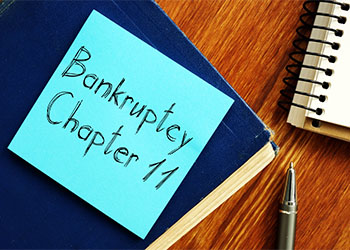Building Effective Creditor Committees in Chapter 11 Cases
Aug. 9, 2025
 When a business files for Chapter 11 bankruptcy, the financial stakes are often high for creditors. Often seen as a path to reorganizing debts and rejuvenating a struggling enterprise, Chapter 11 provides creditors with opportunities to influence the outcome. A vital mechanism for doing so is through the formation of creditor committees.
When a business files for Chapter 11 bankruptcy, the financial stakes are often high for creditors. Often seen as a path to reorganizing debts and rejuvenating a struggling enterprise, Chapter 11 provides creditors with opportunities to influence the outcome. A vital mechanism for doing so is through the formation of creditor committees.
These committees wield significant influence over the bankruptcy case and represent the collective interests of unsecured creditors and ensuring their voices are heard. Understanding how to form and leverage an effective committee is essential for creditors looking to protect their finances.
At Vivona Pandurangi, PLC, we have extensive experience guiding creditors through bankruptcy proceedings in Virginia. We strive to help creditors understand the key roles of creditor committees, their importance in Chapter 11 cases, and proven strategies for building committees that are both efficient and impactful.
The Role of Creditor Committees
Creditor committees play a pivotal role in Chapter 11 bankruptcy cases. Their formation and operation are governed by the United States Bankruptcy Code and supervised by the United States Trustee. These committees typically represent unsecured creditors, a group that often includes vendors, suppliers, and service providers who lack collateral to secure their claims.
Representation and advocacy: The primary purpose of a creditor committee is to act as the collective voice of unsecured creditors. Individual creditors may find it challenging to participate in every aspect of a Chapter 11 case, but the committee makes sure their interests are presented and protected during key negotiations and court proceedings.
Oversight and decision-making: Creditor committees have the authority to analyze a debtor’s financial disclosures, monitor operational decisions, and engage with the debtor regarding proposals for reorganization plans. By scrutinizing the debtor's actions, the committee can safeguard creditor interests and prevent unfair outcomes, such as the overvaluation of assets or inequitable debt restructuring.
Negotiating power: Creditor committees serve as a key negotiating body. Through collaboration with the debtor, committee members work to secure favorable repayment terms for unsecured creditors, often pursuing higher payouts than initially proposed. A well-organized committee can also influence the debtor's reorganization plan, ensuring it aligns with creditors' priorities.
Importance of an Effective Creditor Committee
While a creditor committee is beneficial, its effectiveness depends on its organization, members, and approach. An underperforming committee can lead to poor decision-making, delays in debt recovery, and inequitable distribution of assets. Therefore, it's important to focus on building an impactful and cohesive committee.
Leveling the playing field: A well-structured creditor committee ensures accountability and transparency during the bankruptcy process. It creates a level playing field where unsecured creditors, without the leverage of collateral, can still assert their claims effectively alongside secured creditors.
Advocating for collective interests: By uniting individual claimants into a single group with shared objectives, a creditor committee magnifies the influence of unsecured creditors. This collective power makes sure creditors are not sidelined during proceedings and that they remain equal stakeholders in shaping the case's resolution.
Maintaining efficiency: Through financial oversight, an effective committee can streamline the bankruptcy process. This not only benefits creditors by accelerating payouts but also helps preserve the operational stability of the debtor’s business, improving overall recovery prospects.
Tips for Building an Effective Creditor Committee
Establishing a strong creditor committee requires thoughtful planning and collaboration. Whether you are spearheading the formation of a committee or advocating for its inclusion in a Chapter 11 case, the following strategies may prove invaluable:
1. Select the Right Members
The strength of a creditor committee lies in the quality of its members. Ideally, committee members should reflect the diverse interests of the creditor pool and bring relevant expertise to the table. Some common considerations when selecting members include:
Nature of claims: Including creditors with varied claims (e.g., trade creditors, landlords, and suppliers) highlights broad representation.
Financial expertise: Members with financial or operational expertise can better scrutinize financial data and evaluate reorganization plans.
Commitment: Active participation in meetings and negotiations is essential, so members must have the willingness to invest time in the process.
2. Establish Clear Objectives
From the outset, the committee must define its goals. Whether the priority is maximizing debt recovery, influencing the reorganization plan, or preserving business relationships, aligning member perspectives allows for cohesive decision-making. Clear objectives also help the committee negotiate effectively with the debtor.
3. Collaborate with Professionals
An effective committee relies on the expertise of legal and financial professionals. Bankruptcy attorneys and financial advisors provide critical guidance on complicated issues, such as evaluating repayment proposals, identifying potential fraud, or contesting preferential transfers made before the bankruptcy filing.
At Vivona Pandurangi, PLC, we regularly advise creditor committees on navigating Virginia’s bankruptcy laws and federal regulations. Our experience allows us to provide tailored strategies that help committees achieve their objectives.
4. Maintain Transparency and Communication
Open communication among committee members and with the broader creditor pool is key to maintaining trust. Regular updates, shared meeting notes, and opportunities for input ensure everyone feels engaged in the process. Transparency not only strengthens internal cooperation but also lends credibility to the committee’s actions in court.
5. Prioritize Long-Term Goals
While the immediate goal of any committee is to recover owed amounts, it’s important to think beyond short-term results. Preserving the debtor’s business viability can often lead to higher long-term payouts and sustained business relationships. An effective committee balances individual creditor demands with long-term considerations for collective benefit.
The Importance of Legal Guidance in Chapter 11 Cases
The importance of building and operating an effective creditor committee cannot be overstated. From selecting members to interpreting financial disclosures and coordinating legal strategies, each step requires a depth of knowledge and attention to detail. This is where experienced legal counsel proves invaluable.
At Vivona Pandurangi, PLC, we understand the unique challenges creditors face during Chapter 11 proceedings. Based in Falls Church and Alexandria, Virginia, we provide comprehensive support to creditor committees throughout Northern Virginia. Whether you need assistance forming a committee, interpreting bankruptcy laws, or negotiating favorable outcomes, we are here to guide you.
Reach Out to an Experienced Bankruptcy Attorney
An effective creditor committee is not just a procedural formality; it is a powerful tool for securing fair treatment and maximizing recovery in Chapter 11 cases. By focusing on strategic member selection, clear objectives, and professional collaboration, creditors can wield significant influence over a reorganization process that might otherwise leave them at a disadvantage.
If your business is involved in a Chapter 11 case, do not leave your financial interests to chance. Contact our attorneys at Vivona Pandurangi, PLC, to schedule a consultation. With offices in Falls Church and Alexandria, Virginia, we serve clients throughout Arlington, Fairfax, Manassas, and Loudoun. Reach out today.
